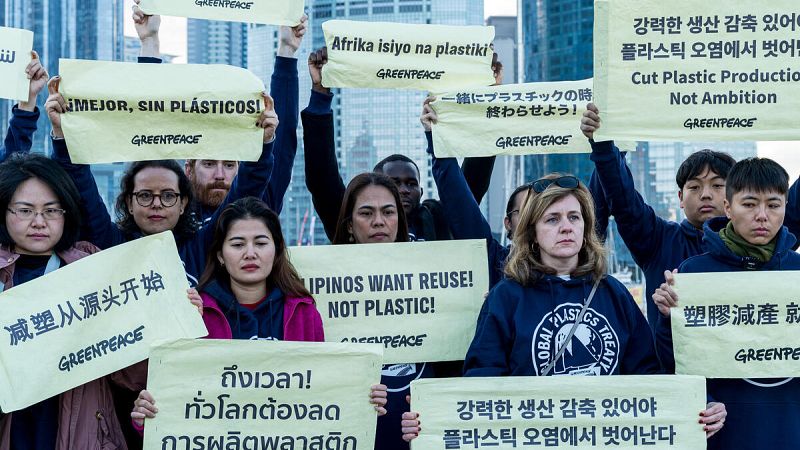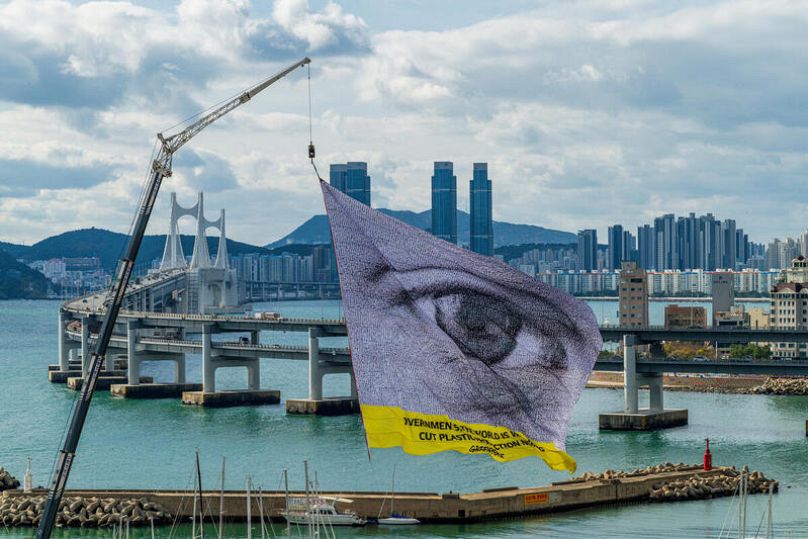‘The world is watching’: Activists pressure world leaders to drastically curb plastic pollution

The second day of negotiations for a treaty to curb plastic pollution is underway after environmental activists and civil society warned leaders that “the world is watching”.
National delegations are gathering in Busan, South Korea, for a week of discussions aiming to finalise a Global Plastics Treaty - a historic, legally binding agreement to regulate the material throughout its life cycle.
There has been pushback against restricting the amount of plastic companies are allowed to produce. Countries with sizeable fossil fuel sectors are calling for a focus on waste management and recycling instead.
Here’s how campaigners, leaders, and non-governmental organisations have responded to the talks so far.
‘We can land this deal’ says UNEP chief
In her remarks at the negotiations’ opening session, the United Nations Environment Programme (UNEP) chief Inger Andersen stressed the importance of securing a deal this week.
“We all recognise the stakes that are on the table right now,” Andersen said. “The multilateral system, the UN system, is the only place where these kinds of things can be delivered.”
UNEP’s executive director underlined that compromise will be required and that securing an imperfect deal was better than no agreement.
“A stake in the ground is better than no stake at all, and then one can tighten it as one goes along,” she said.
She compared this week’s talks to COP29, where a funding deal of $300bn (€286bn) a year in climate finance was reached, recognising that while many parties considered it inadequate, “it is better than $100 billion” (€95bn).
Calling for delegates to “come under [the] canopy” of the “big tent”, she acknowledged that areas of disagreement were likely to persist.
She struck an optimistic note while reminding delegates that the world expected action. “We absolutely can in the remaining days, land this,” she said. “The public expects this deal to be gavelled.”
But while Andersen thanked civil society for their involvement in her opening remarks, Friends of the Earth on Tuesday criticised the negotiations for shutting out affected communities due to limited space, claiming that “civil society space is shrinking at the UN”.
Greenpeace warns leaders ‘the world is watching’
As Andersen reminded delegates that civil society was counting on leaders to reach a consensus this week, Greenpeace unfurled a giant flag daubed with an eye composed of thousands of portraits. The image sent a clear message: the world is watching.
“This is a make or break moment where governments in Africa and around the world have another chance to agree on an ambitious Global Plastics Treaty – that could solve the planetary crisis brought by runaway plastic production and safeguard our planet, our health and future generations,” the Pan-African Plastics project lead at Greenpeace Africa, Hellen Kahaso Dena, said.
“Will our leaders rise to the occasion or dance to the tune of fossil fuel lobbyists?”
It came as a Greenpeace petition demanding a treaty to severely cut plastic production and consumption gained almost three million signatures, underlining the public support for decisive, legally binding action.
The Break Free From Plastic campaign’s global coordinator, Von Hernandez, stressed that failing to reach a robust agreement to protect the planet and people’s health would be “a missed opportunity”.
“Millions worldwide demand a strong plastics treaty to reverse the global plastic pollution crisis now harming our health, our climate, and the planet’s life support systems. World leaders gathering here in Busan must deliver an agreement that progressively cuts the unfettered production of plastic and eliminates the toxic chemicals associated with their manufacture and use. Anything less than this would be a regrettable missed opportunity.”
Plastic production ‘set to triple by 2060’
The executive vice-president for the European Green Deal, Maroš Šefčovič, warned that if action is not taken, plastic production is set to triple in under four decades. “Plastics are choking our oceans, polluting the environment and harming people’s health and livelihoods. If business as usual continues, plastic production will triple by 2060.”
He called on leaders to lock in an agreement “that delivers for people and the planet”. “We now have a chance to demonstrate how we can take action jointly to promote a more circular and sustainable economy for plastics,” he said, underlining the EU’s willingness to engage with other parties and commit to a treaty.
Meanwhile, the Korean environment minister also underlined the severity of failing to act: “We must end plastic pollution before plastic pollution ends us.”
Today


